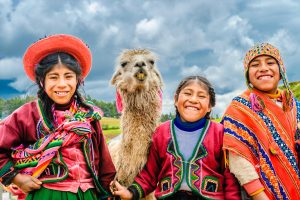What does ‘country ownership’ really mean?
At a time when the global health and development field is grappling with how to change traditional power dynamics, ‘country ownership’ is often touted as a way forward. But what does that mean? And how can funders and country partners best work together to achieve meaningful, sustainable results?
Too often, even when funders strive to recognize and strengthen local expertise so that successful interventions can be sustained, the power remains with whoever writes the checks. And though ‘country ownership’ isn’t a new concept in the development space, no clear framework exists for establishing it as a central tenet of the funder/grantee relationship. 
‘Ownership’ is the first principle of the 2005 Paris Declaration on Aid Effectiveness, and major donors have been grappling with the concept since then, with limited results. For example, USAID released its acquisition and assistance strategy in March, and it ‘outlines the necessary tools and culture shifts needed to increase USAID’s engagement with local organisations and to reduce bureaucratic burdens for its staff and partners.’ With only 1.2 per cent of international humanitarian assistance going directly to local NGOs, the need for strengthening country ownership is evident.
Over the past four years, Vital Strategies’ Bloomberg Philanthropies Data for Health Global Grants Program made over 80 grants to partners in 41 countries around the world to support data use for population health impact, and we still don’t have a perfect playbook. But with our partners, we learned some valuable lessons that we have implemented across our portfolio. Here are examples of practices from four countries that not only drive program progress, but also lay the foundation for equitable and transparent partnerships.
Country priority setting: An example from Peru
Country priority setting is the foundation of ownership. Open calls for applications empower country teams to bring their own plans to solve the problems they’ve identified as most pressing. Sometimes that may be to pilot a new approach to a longstanding or newly urgent problem. This was the case in Peru, where the government set out to address an existing problem: low death registration in hard-to-reach areas. The lack of internet access in rural areas was a key barrier, so the team developed and piloted an offline version of the existing death registration software. Now the offline version is an official method for death registration in parts of Peru with low connectivity. This was a relatively inexpensive intervention, costing US $60,000, that established the cause for every recorded death that year in a remote region of Peru and left a system to continue to capture the data moving forward.
Open calls for applications empower country teams to bring their own plans to solve the problems they’ve identified as most pressing. Sometimes that may be to pilot a new approach to a longstanding or newly urgent problem.
Simplified and streamlined processes: An example from Kiribati
Simplifying applications and reporting can be effective for promoting country ownership. Onerous, unnecessarily complex processes can deter potential applicants, especially smaller groups with limited human and financial resources. Requiring only high-level budgets along with simple narrative applications and key supporting documents allows for proper due diligence and financial controls while enabling a more diverse pool of applicants, such as smaller governments, lightly staffed government agencies or local NGOs.
For example, the government of Kiribati wanted to harmonize multiple datasets into one source of demographic and population data but would have been deterred by a lengthy proposal for funding. With streamlined application and reporting requirements, their small team was able to focus on implementation and achieve their goals, despite limited staff who are frequently required to travel across the remote island nation to respond to a range of issues.
Technical exchange, not technical assistance: An example from Malawi
In efforts to shift power dynamics in our sector, it’s important to innovate and keep what’s already working. Funders have an important role in providing technical guidance when requested by partners, and building in time for this during the application or initial engagement can open channels of communication from the outset.
However, traditional aid structures that situate only the funders and international experts as the suppliers of technical assistance do a disservice to local experience and expertise. Regional and local expertise is a large and robust source of talent that can be leveraged by establishing or strengthening networks among regional and local experts and broader groups such as communities of practice.
For example, a regional technical exchange went into action when a team from Malawi applied for support to undertake a training program that equips public health practitioners to develop technical and policy briefs to support evidence-based policymaking. A team from Zambia that had completed the training offered technical expertise and mentoring to the Malawi team, and the Malawi team later cascaded the training to other government staff.
Culture of flexibility and trust: An example from Ecuador
Trust is at the core of country ownership. Governments and local NGOs deserve access to funding without undergoing onerous and time-consuming scrutiny, to discover the solutions to their own problems, and to work on their own priorities.
Covid-19 brought the benefits of flexibility into sharp focus, as the global health sector rapidly pivoted to respond to the pandemic. Even during more ‘normal’ times, flexibility is essential to respond to changes in external circumstances or discoveries that influence a planned course of action.
In Ecuador, the team planned to link several databases across ministries to identify children at risk of malnutrition and provide them with the services they need in a timely and efficient manner. The team later submitted a proposal to adapt the original project and established a cross-ministry data sharing system that has already identified and delivered cash transfers to thousands of families at risk of malnutrition as well as helped provide thousands of health, registration and child development services. Although the initial goal was met, in the process the team needed to adapt the project to meet several requirements that could have not been foreseen in the beginning, like the necessities of field operators of the executing ministries and the need for constant reengineering, which was a process of learning by doing. Without the flexibility to initially pivot the project, the work might have stalled indefinitely.
We have found that these updates to projects generally improve the work—and experience shows that simple processes to enable them also reinforce trust between partners.
These principles reinforced country ownership in these and many other projects the Global Grants Program has supported, and there are other best practices in philanthropy that should be considered as well. The Trust-Based Philanthropy Project lists six key practices of trust-based grant making. For example, giving multi-year, unrestricted funding offers partners the security and stability needed to work efficiently to build organizational systems and human capacity.
Following these principles and practices can help to centre country ownership as the basis for the relationship between grant makers and grantees and can go a long way toward shifting the balance of power. It’s a change that is long overdue.
Carlie Congdon is a Technical Advisor for Civil Registration and Vital Statistics (CRVS) and the Global Grants Program at Vital Strategies, part of the Bloomberg Philanthropies Data for Health Initiative.
Lara Tabac is the Director of the Global Grants Program which has invested over $10 million since 2019 to improve public health data systems worldwide.







Comments (0)